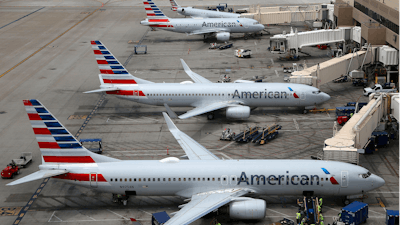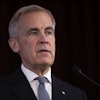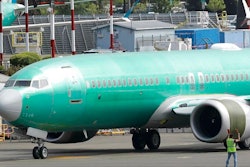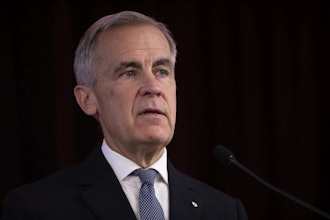
DALLAS (AP) — Airlines are tallying up the damage and talking to Boeing about compensation for the grounding of the troubled 737 Max jet. On Thursday, two of the three large U.S. airlines that own Max jets updated their estimates of how the plane is hurting their bottom lines.
American Airlines said its 2019 earnings will be reduced by $400 million — $50 million more than its previous estimate. Southwest Airlines said the grounding trimmed $175 million from its second-quarter operating profit.
Southwest also announced that because it has fewer planes without the Max, it will end service at a major airport in the New York City area. And it dropped the plane from its schedule until early January — two months longer than American — to allow time for pilot retraining and avoid disruptions for holiday-season travelers.
Airline executives, however, are standing behind the plane and betting that passengers will get back on board. The Max has been grounded since March after two crashes killed a total of 346 people. "We believe that the Max 8 is the best airplane in its category," Southwest Chairman and CEO Gary Kelly told investors. "We want as many Maxes as we can practically deploy as soon as possible."
American Airlines Chairman and CEO Doug Parker said once the Federal Aviation Administration approves Boeing changes to the plane and pilots are comfortable that they are adequately trained to fly it, that "will make the difference in consumer attitudes about the aircraft itself." This week, Boeing reported its largest quarterly loss ever, nearly $3 billion, after setting aside $5.6 billion to cover compensation to its airline customers.
Boeing CEO Dennis Muilenburg said he expects the Max to return to service in October after the company completes software updates in September. He said Boeing might have to reduce or even pause Max production if the grounding lasts much longer. Previous Boeing forecasts have turned out to be too optimistic, however, and Muilenburg conceded there is a risk that new issues could be found on the plane.
When the plane was grounded in March, Southwest owned 34 of them, the most of any of the several dozen airlines that were using the plane. That's nearly five percent of Southwest's fleet and eight percent of the airline's passenger-carrying capacity.
Without those planes, Southwest is canceling about 180 flights a day through Jan. 5, nearly five percent of its schedule, and taking the unusual step of shrinking rather than growing its passenger-carrying capacity. It canceled fall training classes for new pilots — in effect, a hiring freeze.
To make the best use of its remaining planes, Southwest will shut down operations at Newark Liberty International Airport in New Jersey — results there have been disappointing anyway — on November 3 and consolidate service at New York's LaGuardia Airport.
Kelly said Southwest has had "preliminary discussions" with Boeing about compensation without reaching any conclusion. American Airlines, which had 24 Max jets, is canceling about 115 flights a day through November 2 because of the grounding. Airline executives said last-minute bookings dropped for more than a month after the Max was grounded because business travelers feared being stranded by a cancellation. The company said the Max cut $175 million from its second-quarter profit.
Parker, the American CEO, said on a call with analysts that there have been "conversations with the highest levels of Boeing about what our expectations are" for compensation. He said the discussions didn't get into details, and he declined to say who talked to whom.
Boeing has suggested that compensation will not be entirely in cash. Analysts believe airlines could receive discounts on future orders or other services. The grounding contributed to rising costs at Southwest, which reported that second-quarter profit rose one percent from a year ago, to $741 million, despite the missing Max planes.
The results were slightly better than analysts expected. Brisk demand for travel translated into fewer empty seats than ever before, and Southwest said it expects revenue to remain strong through September. The Dallas-based airline said earnings after special items like the Max were $1.37 per share, two cents better than the average forecast from 10 analysts surveyed by Zacks Investment Research. Revenue rose three percent to $5.91 billion.
American said second-quarter profit rose 19 percent to $662 million despite a $175 million pretax hit from the Max grounding. The Fort Worth, Texas-based company said that excluding non-repeating costs, it would have earned $1.82 per share, five cents better than analysts in the Zacks survey expected. Revenue rose three percent to $11.96 billion.
American faces other problems besides the Max. Cancellations have soared this summer partly because of what the airline contends is an illegal work slowdown by mechanics. Parker said the airline often has more planes out of service for mechanical issues than it has spares. "By definition that means you are starting the day canceling some flights," he said.
A federal judge ordered the mechanics' unions to stop the slowdown. The unions deny wrongdoing. In afternoon trading, shares of Southwest Airlines Co. rose 61 cents to $55.33, while American Airlines Group Inc. sank $2.75, or 7.9%, to $31.84.





















